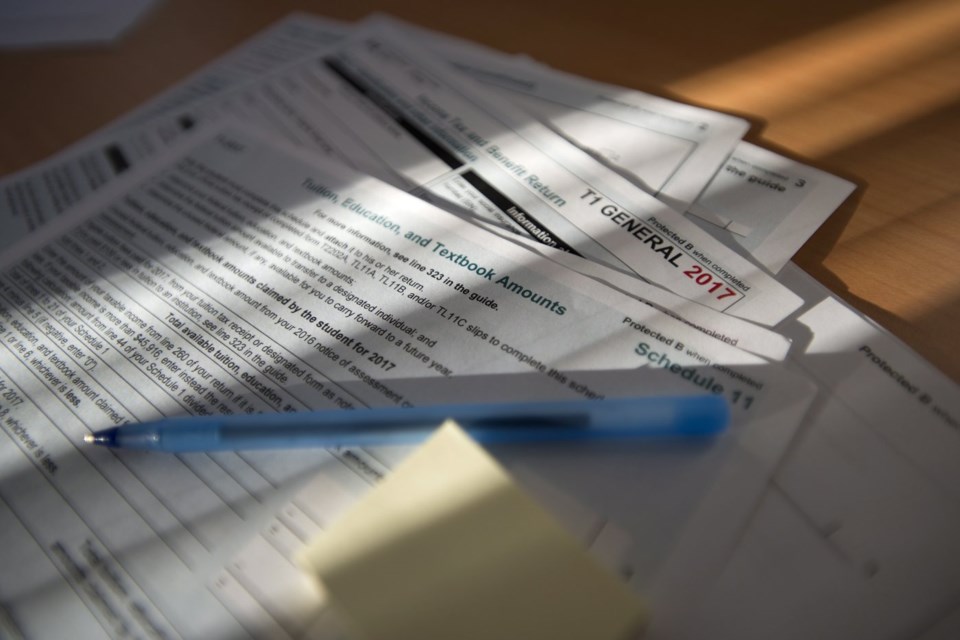You could be selling your art on Etsy or delivering late-night orders for Uber Eats.
Maybe you dog-sit on weekends for out-of-town pet owners, or tutor kids who need help with their homework after school.
No matter the side hustle, financial experts say it's important to be aware of the rules surrounding your income declaration, especially as key deadlines for tax-filing season approach.
Misconceptions are common among self-employed workers — often those with side gigs — when it comes to rules for filing taxes, said Yannick Lemay, a tax expert with H&R Block Canada.
He said clients often get confused about how much income they need to earn to be required to declare it on their tax filings. The simple answer, he said, is that "there's no such threshold."
"Any business income has to be declared, even if it's only $1," said Lemay.
"The consequences are pretty severe. If you don't report all your income that you've made during the year, I mean, it can be a criminal offence. You will have penalties."
April 30 is the deadline this year for most people to file their income tax and benefit return, and pay any taxes owed. But those who are self-employed, or have a spouse or common-law partner who is, have until June 16 to file.
However, any money owed must still be paid by April 30, even for those self-employed, in order to avoid paying interest.
The Canada Revenue Agency warns it charges interest on most unpaid balances owing and in some cases, there could be penalties associated with filing a late return or missing a payment deadline.
The two biggest mistakes that self-employed workers usually make are either filing an incorrect amount or doing so late, said Penelope Graham, a personal finance expert for RateHub.
"It's usually the fear of the first that will lead to the latter," she said.
"They're not sure if that bottom line number is correct because these kinds of taxes are a little bit more complex. It's really on you to keep track of what you've earned, the tax that you're actually going to owe on those earnings, as well as anything you can claim as a business expense."
Unlike workers with a direct employer, you don't receive a T4 for self-employed income, she said.
That's why it's a must to treat thorough bookkeeping as a yearlong practice, rather than rushing to figure things out during the busy tax season.
This year also marks an important change for the reporting rules around taxes paid by gig workers who work for digital platform operators, such as delivery drivers or people selling goods or services online.
Certain platforms like DoorDash, Etsy and Airbnb are now required to collect and report information to the CRA on most drivers, sellers and hosts. This information may include identifying details like names and addresses, platform fees, property locations and payment details.
Although workers don't have to do anything different themselves, Lemay said the new rules allow the CRA to compare the amounts reported on their tax returns to information provided by the platforms — underscoring the importance of being accurate.
"Now the CRA is aware of that business income you've made without you telling them," he said.
In 2023, more than 2.6 million people in Canada were considered self-employed, making up 13.2 per cent of the employed population, according to figures released last year by Statistics Canada.
With the rise of digital platforms, self-employment is becoming more common as a way to earn income, even on the side, said Francisco Remolino, principal and licensed insolvency trustee at Remolino & Associates.
He said it's also a response to ongoing economic pressures, such as the high cost of living and housing affordability problems. But he said the challenge is that once you have a side-gig, and therefore a second source of income, your taxes could go up as a result of being in a higher tax bracket.
"People are trying to get creative as to how they can supplement their income," Remolino said.
"So yes, we've seen an increase in people working with a supplemental income, but we're also seeing an increase in people defaulting on taxes simply because they don't know."
For those new to filing taxes on income from their side hustle, Graham said she recommends setting aside money to consult an accountant or using a reputable tax-filing software in order to avoid errors.
"There's no shame in getting a little bit of help to make sure you're doing this correctly, especially when you're still learning the tax requirements," she said.
"Because especially when it comes to things like claiming your expenses, which can have a very drastic impact on your bottom line as someone who's self-employed, it's really important to understand what qualifies."
This report by The Canadian Press was first published April 17, 2025.
Sammy Hudes, The Canadian Press


